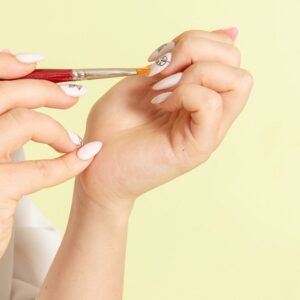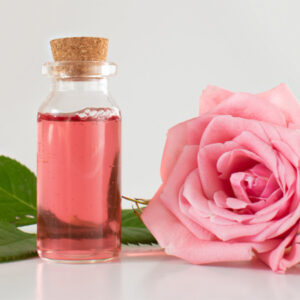Sun protection is the key to youthful skin. While you buy and use products to make your skin healthy and beautiful, the sun ruins all your efforts when you step out under the sun. You must use sunscreen every day and make it a non-negotiable part of your skincare routine.
All skin types need sun protection, irrespective of skin tone. The harmful rays of the sun can cause damage to your skin in many ways. Indian skin tones are more exposed to sun rays, and it will be wrong to assume that dark skin tone does not require sun protection.
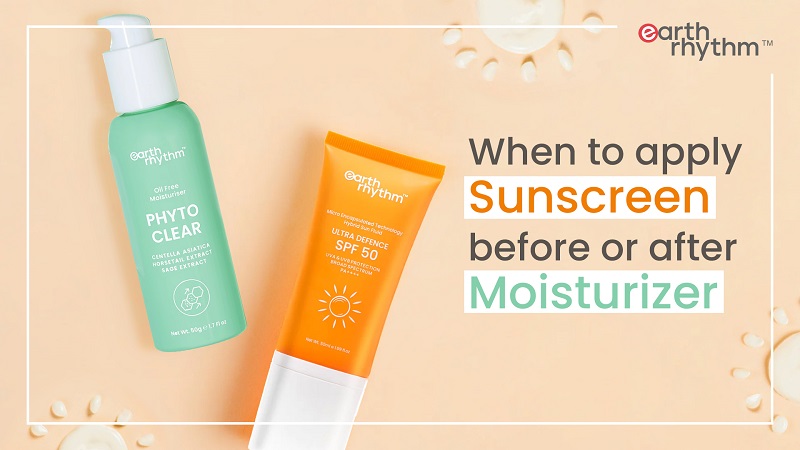
Apply a moderate amount of sunscreen after you have moisturised your face. These sunblocks reflect the sun rays from the skin and do not let them penetrate the skin. For chemical sunscreens, apply before moisturising your face. Earth Rhythm Ultra Defence SPF 50 Sunscreen for oily/dry skin in India has a gel-based lightweight fluid texture that comes with sustainable packaging, an airless pump-based tube & is travel-friendly.
What is a Moisturiser?
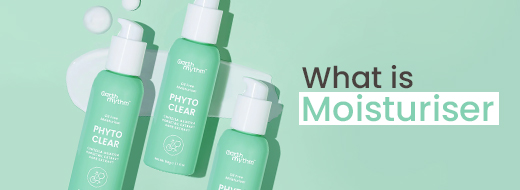
A moisturiser is a cosmetic product that lubricates your skin and hydrates it. It improves your skin’s overall health by not letting it get dry and dehydrated. There are many therapeutic uses of moisturisers to deal with skin problems.
There are three broad categories of a moisturiser: emollients, occlusive and humectants. They also come in various textures, formulated to suit various skin types and problems. Different textures of moisturisers are available based on skin type.
Moisturisers are crucial for your skin as they act as barriers, controlling the signs of early ageing, wrinkles and fine lines. They keep the moisture locked in your skin and prevent uneven skin tone and give a youthful look.
When Should I Apply Sunscreen: Before or After Moisturising the Face?
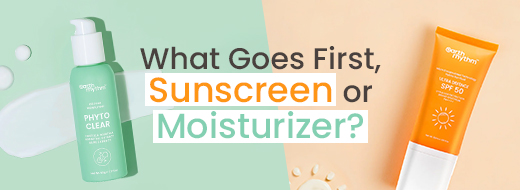
The type and composition of the product decide whether you should apply it before or after a moisturiser in your skincare routine. Physical and chemical sunscreens work differently on the skin to protect it from harmful sun rays.
The chemical variants need to be fully absorbed in the skin to act against the sun’s rays. They absorb the UV rays and inactivate them through chemical reactions. The physical ones act as a physical barrier that reflects the sun’s rays from the skin’s surface.
Physical or mineral-type sunscreens are a better choice for people with oily or acne-prone skin. Sensitive skin may react to chemical variants. Thus, people should use sunblock with a mineral formulation if they have sensitive skin.
You should always moisturise your face with a moisturising cream or gel before you apply any kind of sun cream, stick or gel on your face and other exposed areas. It enhances the sun barrier and does not let your skin get dry.
It is important to note that both of them are different skincare products. They are not substitutes for each other. The primary function of a sun cream or gel is to shield your skin from the sun, while a moisturising cream or gel gives your skin a daily dose of hydration.
In summer, it is necessary to moisturise your face, even if you are using a hydrating sunblock. It helps your skin to retain moisture, hydrates and helps control signs of early ageing. Additionally, it makes it easy to blend sunscreen into your skin.
Do I Need to Wait Until After Moisturising My Face to Apply a Sunblock?
There are no rules for this. However, after moisturising, it is advisable to wait for a minute or two. It allows the product to get absorbed completely in the skin before you apply the sun creams, gels or glide-on sun sticks.
Takeaways for Including Both Sunscreens and Moisturisers in Skincare Routine
Below are certain rules and tips that dermatologists and skincare experts swear by:
- Always apply a physical sunblock after the moisturising cream or gel.
- It is better to use separate products for sun protection and for moisturising your skin instead of mixing them or relying only on hydrating sunblocks.
- Sun protection has to be the non-negotiable step of your skincare.
- You should reapply sunblocks every two to three hours.
Apply physical or mineral sunscreen after you have moisturised your face. Sun protection is a must when it comes to taking good care of your skin. Without sun protection, any other skincare product that you use will not work at its best.
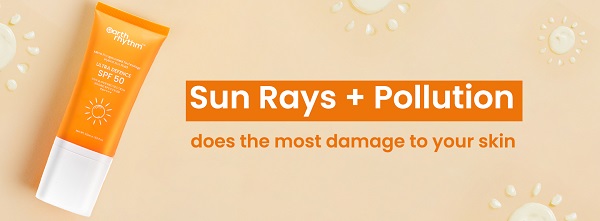
You will see visible results of a reduction in tanning, fine lines and wrinkles with better sun protection. But your face also needs to be moisturised well before you put on your sunblock, otherwise, it will miss its required hydration.
Best SPF 50 Sunscreen For Combination Skin: Early signs of ageing, tanning, wrinkles, hyperpigmentation, skin irritation and redness are some of the symptoms of irritated skin. These arise due to prolonged sun exposure with sun protection. But remember, for the protection to be effective in its action, a hydrated face is a must.

